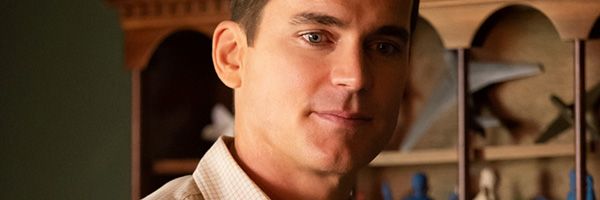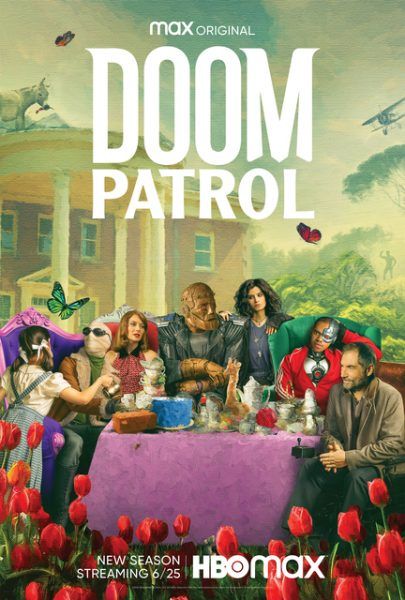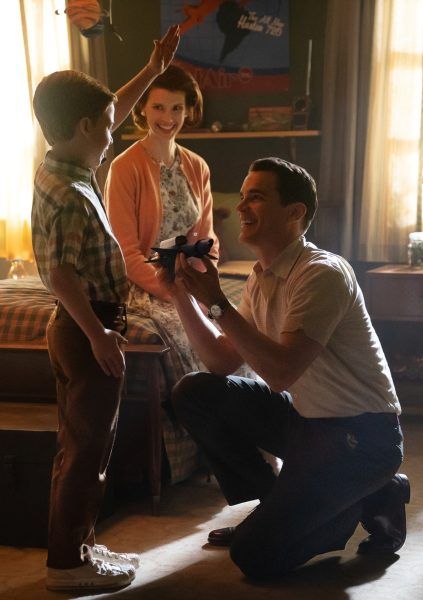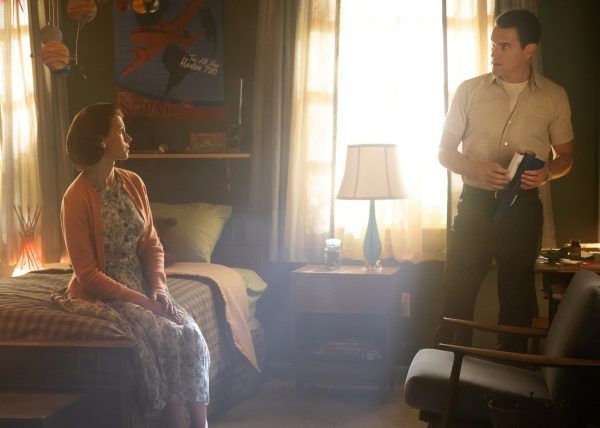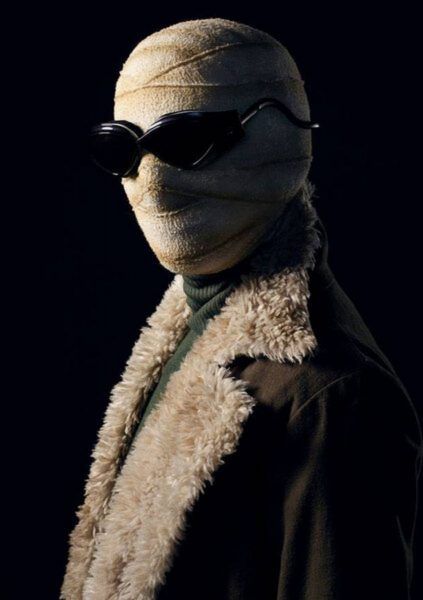In Season 2 of Doom Patrol, the DC Universe’s strangest and most reluctant group of heroes are working to overcome their own challenges and save the world is by growing beyond their own past traumatic experiences and working together. Even though Cliff Steele aka Robotman (Brendan Fraser), Larry Trainor aka Negative Man (Matt Bomer), Rita Farr aka Elasti-Woman (April Bowlby), Jane aka Crazy Jane (Diane Guerrero) and Victor Stone aka Cyborg (Joivan Wade) are still angry about the betrayal they each experienced at the hands of Niles Caulder aka The Chief (Timothy Dalton), a man they previously looked up to and turned to for support, they still must protect the newest member of the family, Dorothy Spinner (Abigail Shapiro), while they try to understand her powers and the threat that they represent.
During this 1-on-1 phone interview with Collider, actor Matt Bomer talked about how weird and wild but grounded Doom Patrol is, the incredible villains in Season 2, what he most enjoyed about the arc for Larry Trainor this season, the unique collaboration that he has with Matthew Zuk for this character, and why he loves the Larry-Rita dynamic. He also talked about the possibility of a return for White Collar and the type of run he’d like to see for the show, and whether he’s considered directing an episode of Doom Patrol.
Collider: I love this show, and how weird and wild it is. Did you have any idea where things were going to go, for Season 2?
MATT BOMER: I had no clue. I obviously had high expectations because it’s one of the greatest writers’ rooms that I’ve ever had the chance to work with. I just thought, “How are they possibly gonna one-up themselves from last season?” And somehow they did it. It wasn’t just for sensational effect. It’s all grounded in a sense of real pathos and character development.
The one given with this show is that you know things are going to get weird, but did you know, from the beginning, just how weird things were going to get?
BOMER: Well, yeah. When the donkey farted out the next guiding steps they had to take, in the pilot episode, you get a sense that you’re gonna be dealing with a show that’s absurdist and abstract, and funny and unique, and maybe just a little bit trippy.
How would you say that the level of weird of Season 2 compares to the level of weird of Season 1?
BOMER: I would say that they one-upped themselves somehow, but it’s not done just to be weird. It’s all really grounded. We have these incredible villains this season, with Doctor Tyme and Red Jack, and there’s this subset squad of heroes called the SeX-Men. And then, we have Dorothy Spinner, who has the ability to bring to life anything that she can imagine, and she comes with her own demons, so to speak. But it’s really a season about trauma, and all of the different characters dealing with their own trauma, unearthing trauma, and trying to move past it. And the villain this season is as much internal as it is external, for all the players.
What did you most enjoy about digging into, with Larry’s arc for this season and the journey that he takes?
BOMER: I don’t think it would be a season of Doom Patrol, if all of the characters didn’t have to get personal, at some point. Throughout the season, working with LGBTQ acceptance, mental illness, body image, PTSD, abuse, and all those things. When we find Larry, he’s living in closer harmony with the negative spirit inside of him. He learns that his estranged, youngest son has recently committed suicide, and that leads him to try to reconnect with the surviving son, only to be forced to deal with the generational damage that he’s done to his family. And so, there are these incredibly abstract scenes, that are, so filled with pathos, where Larry is seeing his son, for the first time, but he’s 1960s Larry, in the prime of his life, and doing a scene with this son, who’s much older than he is now, and he’s seeing him for the first time, since he was a little child. So, you can imagine how painful and moving that is for him and, hopefully, for the audience.
What’s it like to go through this unusual process of playing this character in flashbacks and voicing him in the present, while another actor is playing him, and not even really being on set with your co-stars?
BOMER: It is a very disparate experience, as an actor. Oftentimes, one of my favorite things is connecting with an ensemble. I came from the theater, where connecting with the people around you and creating together is everything. But what’s amazing about this show is that it all works. As disparate as it is, it all works. I love the unique collaboration I have with Matthew Zuk. There was no precedent for this, when we started working on it. We were before The Mandalorian, and all of those things. Trust me, as an actor, I looked for an example, but there wasn’t a precedent. We had to suss it out, as we were going, in the first season. I don’t think we really locked into it, until maybe Episode 5 or 6. And now, we have this great creative, collaborative flow, with Matthew and I, where there’s just a constant back and forth, and we’re in communication throughout the season, with each other, about everything that’s going on and how we can create the scene together. So, that part is completely unique and collaborative and ensemble-oriented, in a way that you rarely get, as an actor. Every now and again, I’ll get to go in and do something that’s big budget or special effects driven, and then I’ll feel like, “Oh, okay, I’m on this show.” But for the most part, I’m just dealing with members of my family or people from Larry’s past, or I’m in six hours of prosthetics, screaming at the sky. It’s a very individual experience, but also a great collaboration with the people who are playing my family members. But it doesn’t feel like I’m on a comic book show, by any stretch of the imagination. It feels like I’m on a real character driven drama.
One of the big revelations in Season 1 of Doom Patrol is that Chief was actually involved in the accidents that gave these people their different abilities, which was a pretty shocking reveal.
BOMER: That punk.
How can they ever move on from that realization, and how does that affect Larry, specifically?
BOMER: At the beginning of the season, rightfully, everyone is still pissed at Chief. Everyone is pretty much pissed at Niles, for a good portion of season, but there are inciting incidents that take place that put some aspects of personal relationships on the back burner, so that we can get to the problems that need to be handled first. And the writers, being as creative and brilliant as they are, found ways to make Chief stay relatable and empathetic, and someone who, as an audience, you can understand.
How has it been for them to deal with having Dorothy there, when she represents why they’re in the situation they’re in?
BOMER: What Dorothy brings to the table is that she’s this young girl who can bring to life, anything she can imagine, which gives her the potential to be the most powerful and destructive force in the world. Niles and the Doom Patrol need to come together to protect her and keep her powers under control.
Which seems like it would be hard to do, when you know that she’s the reason they you are the way you are.
BOMER: Yeah, but she’s a child. She didn’t do anything maliciously. There is a sense of reticence about bonding with Dorothy, for sure, but at the same time, what I love about the show is that it’s a character drama, ultimately, and it’s about he capacity for even the most marginalized among us to find their inner heroes. This delinquent group, many of whom hate superheroes, are ultimately taking a heroic stance, in terms of how they’re relating to and handling Dorothy.
I love when we get to see moments between Larry and Rita because their dynamic is a really interesting one and they seem to really both understand the pain of the other one. What do you enjoy about their bond?
BOMER: I love their relationship so much. I just think April [Bowlby] is phenomenal in her role. I know April well enough, at this point, and we’ve talked enough, that I understand how Rita relates to Larry and what that relationship is about. It’s fun to do an initial track, where I put my own spin on it, and then see what happens when she and Matthew are together, which can change everything, in terms of the performance, and then go back in. Oftentimes, I’ll have her performance to work off of, and sometimes, the initial track that you record works in complete harmony with what she does. I love their relationship. I love their understanding of each other. I don’t know how deeply I wanna get into this, but she comes from a time period where women had an acceptance of gay men and they didn’t have to talk about it, if it wasn’t something that the man or woman was comfortable talking about. And so, there’s just an unspoken love and acceptance there, that I think they spent 60 years having in the mansion, before Larry was able to come out. I think there’s something so profound and beautiful about how she’s known, all of this time, and loves and accepted him, long before he could ever tell her who he really was.
This character is a gay superhero, but he’s not just the funny friend or the sidekick, or what you would normally get on a show or with a character like this. He’s so layered and complex, and his life could not be much more complicated than it is. Was that something that was also important to you? Is that a major appeal for doing this?
BOMER: It was everything to me. And I think we owe so much to Greg Berlanti, in terms of creating representation and three-dimensional characters on the LGBTQ spectrum, on all the shows he does, for the most part. I’ll be honest with you, I was just finishing up the run of The Boys in the Band on Broadway. I was not looking to do a comic book series. That’s not what was on the forefront of my mind. I was open to anything. But when I spoke to Greg and Jeremy, and they talked about this character, I thought, “Oh, my god, this is a really three-dimensional character, a fully realized character. He’s not set dressing. He’s not just a stereotype or comic relief. He’s a real human being that they’re creating. How profound, I get to bring this into a comic book show and a superhero show.” And then, I read the script and thought, “This is just one of the funniest, most absurd, incredible things I’ve ever read. It’s a no-brainer. We’re doing this.”
When the first script is that good, does that make you scared about reading any more scripts, to see whether they’d be able to keep that up, throughout the series?
BOMER: I’ve felt that, since day one. And honestly, the writers are so talented that they’ve never let us down. They’ve somehow found a way to constantly one-up themselves, without losing their compass and their focus, or sacrificing character or story, in the process, which is very hard to do. I love comedies, but I’m a tough laugh. It’s tough to get me to really laugh out loud, and this show, when I read the scripts, the way it’s realized really makes me laugh out loud. There’s a running joke when these sex ghosts, this season, that makes me laugh until I cry. They’re just so creative with it. So, I don’t worry, when I read the new scripts. I’m excited when I read the new scripts. Maybe the first couple because you never really know what’s coming at you, after a pilot, and you’re always hoping that they’re able to capture that magic that the pilot has. After I read the few, I just thought, “Oh, this is like Christmas day, when I get to read a new one.”
Are you hoping to get to do more of this? Have there been discussions about another season and where things could go?
BOMER: All of those things are way above my pay grade. Those decisions are made by brass that I just don’t interact with, on a daily basis. I would imagine that they’re gonna see how things land on HBO Max and see how people respond to the season. I know that Jeremy Carver is a brilliant creator and I’m sure he has multiple seasons in mind. I know where things are headed, shortly after this, so if the green light is given that, that writers’ room will be ready.
I was very excited, as I’m sure many people are, to hear that there could possibly be some more White Collar, in the future.
BOMER: That would be nice. Again, those are all decisions that are made, so far above me. I think we, as a cast, love the story and love working together, and we’ve all thrown our hat in the ring and said, “Hey, if you can make this happen, in a way that makes sense, we’re there.” Whether or not the powers that be make that decision is really up to them. I don’t think I would wanna go back to making it a 13-episode show, but it’d be really fun to do four hours, or something, just to catch up with these characters and have a really fun caper together.
Have you had conversations about whether it would stay in New York, or if you could move to a different location?
BOMER: Everything is just fantasy, at this point, so sure, let’s do it in Paris.
It’s just that White Collar, in particular, really could take place anywhere.
BOMER: It could. So much of that would just be determined by who decided to produce it, how much they wanted to put into it, and what kind of effort they wanted to put into it, or if they wanted to stay true to form, or broaden its horizons, in that manner. Those are conversations that are subsequent to a green light.
You directed an episode of American Crime Story. Have you ever considered or thought about directing an episode of Doom Patrol, or is that not something that you would want to deal with?
BOMER: I’ve thought about it, but it takes a very specific type of talent, as a director, to direct a show like this, and it’s a talent that I would need to continue to hone. You really need to be a shooter who understands so many different camera angles and how to move the camera, in such a unique way. As a director, you never just wanna sit there and lean on the director of photography. Getting to direct on Crime Story really played to my stronger suits, as a director. It’s character driven, and you’re really working deeply with the actors, and finding camera angles and movements that really heighten the tension and suspense, and things like that. So, in terms of the scope that you need for a show like this, I think I would have to come down and take the time to really shadow somebody for at least an episode, to see how they make it all happen. There’s a lot going on, and oftentimes, there are multiple units happening. I think almost always, there are multiple units happening. It’s a big world to step into. What I would love to do is one of the new American Horror Story one-offs. That would play to all of my strong suits, as a director. I wanna throw my hat in the ring for that.
Would you want to continue to try directing things that you’re not in?
BOMER: Yeah. Matter of fact, they asked me to play one of the roles in the episode that I did for Versace. I actually talked to Jason Bateman about this ‘cause I think he’s so phenomenal at doing both and he’s just so gifted, in that way, and he was like, “Matt, you could do it. You could act in it and direct.” And I was like, “I don’t know.” Right now, for me, as director, I like to just focus on directing. Once I have my feet under me, a little bit, maybe I’ll move on to doing both.
It seems like it would definitely be something that would be challenging to juggle both.
BOMER: Maybe it’s really liberating. Maybe it takes you out of your head, in a way that really helps you, as an actor. I don’t know. But I’m gonna wait for at least a couple more gigs, before I find out.
Doom Patrol is available to stream at HBO Max and DC Universe, with new episodes on Thursdays.

